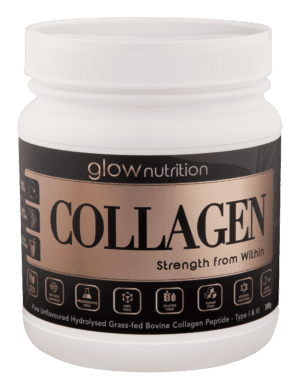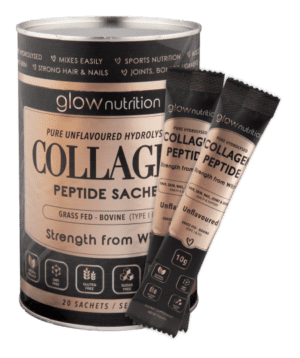Q: What is collagen?
A: Collagen is a protein that acts as a building block for your skin, bones, tendons, and ligaments. It provides structure and support, making it essential for skin elasticity, joint health, and overall body strength. Collagen is the most abundant protein found in the human body. It is a key component of our connective tissue, as well as many of our organs (such as the heart, lungs, and digestive system), including joints, bones, and blood vessels.
Q: Where is collagen mainly found in the body?
A: The human body contains approximately 4 kg of collagen by weight. Starting around age 20, our collagen levels begin to decline, which can lead to signs of aging such as joint pain, wrinkles, and hair loss. Supplementing with collagen can help combat these effects. Around 40% of collagen is found in the skin, while 10-20% is located in bones and cartilage.
Q: What are Collagen Peptides?
A: Collagen peptides are powerful proteins that provide a range of benefits. Adding collagen peptides to your diet not only boosts your protein intake but also supports healthier skin, joints, muscles, cartilage, and more. Made through a special process called enzymatic hydrolysis, collagen peptides are easily absorbed by the body and dissolve well in water without forming a gel. Plus, they contain over 90% protein, making them an excellent choice for your wellness routine.
Q: What is hydrolyzed collagen and what are the benefits?
A: There are three forms of collagen: Collagen, Gelatin, and Collagen Peptides. The term "collagen" is often used interchangeably with collagen peptides, which can lead to some confusion. Collagen is naturally found in animal tissues, and when it undergoes partial hydrolysis, it becomes gelatin. Full hydrolysis results in collagen peptides. Collagen peptides have been clinically proven to support skin health and promote bone and joint wellness, making them a powerful ally in the fight against aging.
Q: Do men need to take collagen?
A: Yes. Both men and women need collagen for optimum health and well-being.
Consuming Collagen
Q: How much collagen should I take daily?
A: Depending on your needs, we recommend a daily intake of 5g – 20g of collagen, which provides 4 to 18gms of protein. Here are some general guidelines:
- For Skin Health: Studies often suggest a dosage of 5 grams per day to improve skin elasticity and hydration.
- For Joint Health: A higher dosage of 10 to 15 grams may be beneficial for those looking to support joint health and reduce discomfort.
- General Wellness: A common daily intake is around 5 to 10 grams for overall benefits.
Q: How should I take collagen?
A: Collagen can be easily incorporated into your daily routine. It’s often available in powder form, which can be mixed into beverages, smoothies, soups, or baked goods.
Q: How often should I take collagen?
A: For optimal results, it's best to take collagen daily. This is the recommended approach to combat the natural decline of collagen in your body.
Q: When is the best time to take collagen?
A: You can take collagen any time of the day. There is no evidence to confirm collagen is more effective taking it in the morning, afternoon, or evening, on an empty stomach, or with additives such as vitamin C.
Q: How long should I take collagen?
A: Taking collagen daily is essential to maintaining all the health benefits, similar to brushing your teeth. Eventually, you will start to see and feel the negative effects from an overall health perspective. Consistency is crucial to optimal health and well-being.
Q: Is 70 too late to take collagen?
A: No age is too late for you to start taking collagen.
Q: How long should I include collagen in my daily diet?
A: For the best results, it's ideal to incorporate collagen into your daily routine indefinitely. This is the most effective way to address the natural decline of collagen in your body.
Q: Can I get enough collagen from my diet?
A: While certain foods like bone broth, fish, and chicken contain collagen, it can be challenging to consume adequate amounts solely through diet. Collagen supplements can help ensure you get enough for optimal health benefits.
Q: Is collagen safe to take?
A: Yes, collagen is generally considered safe for most people. However, it’s always a good idea to consult with a healthcare professional before starting any new supplement, especially if you have allergies or underlying health conditions.
Q: What to look for in choosing a collagen supplement?
A:
Why choose Glow Nutrition Collagen
Q: What is the bioavailability of Glow Nutrition Collagen?
A: Bioavailability refers to how well a substance can be absorbed and utilized by the body. Thanks to our unique hydrolysis process, Glow Nutrition Collagen products are clinically proven to have high bioavailability.
Q: How much protein is in each scoop of Glow Nutrition Collagen?
A: Glow Nutrition Collagen contains 98.5% pure dry protein per scoop.
Q: Is Glow Nutrition Collagen 100% natural?
A: Yes, Glow Nutrition is 100% natural. It contains zero fillers, hormones, antibiotics, hormones, carbs, fat, or sugar.







